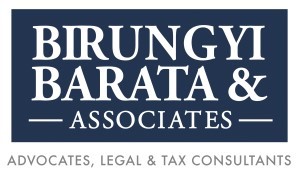

Since 2010, the Global Law Experts annual awards have been celebrating excellence, innovation and performance across the legal communities from around the world.
I INTRODUCTION
The tax environment in Uganda is largely conducive for non-residents seeking to invest in the country. Exit from the jurisdiction does not attract penalties, and the non-resident has the option of establishing a subsidiary or branch/permanent establishment or avoiding the both vehicles depending on what is suitable for the business. Dividends and interest are movable within a group.
II COMMON FORMS OF BUSINESS ORGANISATION AND THEIR TAX TREATMENT
Corporate entities and partnerships are the commonly used vehicles to operate businesses among the medium-sized and large enterprises in Uganda. Most of the small enterprises operate as sole proprietorships, with some being registered and others remaining unregistered.
i Corporate
A company may be a private or public company. A private company is defined under Section 4 of the Companies Act as a company that by its articles restricts the transfer of shares and other securities; limits the number of its members to 100; and prohibits any invitation to the public to subscribe for any shares or debentures of the company.
A public company is one that does not restrict the transfer of shares and other securities; has no limitation on the number of its members; and permits the invitation to the public to subscribe for any shares or debentures of the company.
A company may also have the liability of its members limited by the amount, if any, unpaid on shares respectively held by them (a company limited by shares) or have liability to the amount that the members undertake in the memorandum to contribute to the assets of the company if it is being wound up (a company limited by guarantee), or not having any limit on the liability of its members (an unlimited company).
ii Non-corporate
Partnerships are common among legal practitioners, architects and accountants. This is because they are legally mandated to operate as partnerships. Limited liability partnerships are uncommon although they are provided for under the law.
The affairs of partnerships are only known by the partners and the revenue authority (for those that file tax returns). The partnership files returns showing its income and expenditures.
However, each partner is liable to income tax on a pro rata basis.
III DIRECT TAXATION OF BUSINESSES
The tax regime imposes tax on business profits, rental income and property income. It distinguishes residents from non-residents, exempts a given stream of income from tax and also provides for a range of deductions. The general tax rate is 30 per cent on the profits of residents and 15 per cent on the gross earnings of non-residents. Dividends are withheld at 15 per cent and so is interest from financial institutions.
i Tax on profits
Determination of taxable profit
Taxable profits are generally calculated by subtracting allowable deductions from the gross income. When calculating chargeable income, adjustments should be made in respect of deductions allowed under the tax statute and depreciation. The allowable deductions include the following expenses:
a all expenditures and losses incurred to the extent which they were incurred in the production of income included in the gross income;
b losses incurred in the disposal of a capital asset;
c bad debts;
d interest incurred;
e repairs and minor capital equipment in respect of property occupied or used by a person in the production of income;
f depreciation at a rate of 20 per cent to 40 per cent depending on the nature of the asset;
g initial allowance if the eligible property is outside a radius of 50km from the boundaries of the capital city;
h expenditure on the construction of an industrial building;
i start-up costs;
j cost of acquiring intangible assets (spread through the useful life of the asset);
k scientific research expenditure;
l charitable donation (limited to 5 per cent of the chargeable income);
m expenditures of a capital nature incurred in searching for, discovering and testing or winning access to deposits of minerals in Uganda; and
n rehabilitation expenditure.
Depreciable assets are placed into separate pools for each class of asset, and a depreciation deduction for each pool is calculated by multiplying the written down value at the end of the year of income with the depreciation rate applicable to the pool.
A taxpayer’s method of accounting should conform to generally accepted accounting principles, and taxes may be accounted for on a cash or accrual basis.
However, a taxpayer who intends to change the method of accounting should apply the Commissioner General for approval.
Resident persons are taxed on worldwide income while non-residents are taxed on locally sourced profits.
Capital and income
The law distinguishes income of a revenue nature from income of a capital nature.
However, when calculating the tax payable, the capital profits and revenue profits are pooled together.
Losses
Losses are carried forward and allowed as a deduction in determining the taxpayer’s income in the following year of income. Losses cannot be carried back.
Losses can survive change of ownership provided that there has been a 50 per cent change or more in the underlying ownership and for a period of two years after the change the company carries out the same business and does not engage in any new business or investment aimed to reduce the assessed loss.
Rates
The following rates are applicable:
a corporation tax (other than mining companies): 30 per cent;
b corporation tax for mining companies: 25 per cent to 45 per cent depending on the number of percentage points represented by the ration of chargeable income of the mining company for the year of income to the gross revenue of the year of income for that year;
c withholding tax for interest payments on government securities: 20 per cent;
d income tax for non-resident persons: 15 per cent of gross payment is withheld by the payer;
e withholding tax on interest and dividend payments: 15 per cent;
f withholding tax for dividend payments from companies listed on the stock exchange to individuals: 10 per cent;
g rental tax: 20 per cent for individuals and 30 per cent for companies;
h income tax for shipping and aircraft business for non residents: 2 per cent;
i withholding tax for goods and service transactions: 6 per cent;
j capital gains tax on the purchase of an asset by a resident from a non resident: 15 per cent of the gross amount paid; and
k withholding tax on the payment of reinsurance premiums by a resident to a non-resident: 10 per cent.
Administration
A company is required to file income tax returns within six months of the end of the year of income. Provisional tax is paid by a resident company in two instalments (on or before the last day of the sixth and 12th months of the year of income) and it is based on the estimated tax payable.
The Uganda Revenue Authority is legally mandated to administer tax laws on income tax, value added tax, customs duty, excise duty, stamp duty, etc. There is no regular routine audit, but a corporation is audited at least once per five years depending on the risk indicators as perceived by the revenue authority. There are levies, such as local service tax, that are collected by municipalities.
The revenue authority may, upon application in writing by a taxpayer, issue to the taxpayer a private ruling setting out the position of the revenue authority regarding the application of a provision in a tax law to a transaction entered into or proposed to be entered into by the taxpayer. The private ruling is binding on the authority but not on the taxpayer.
A person dissatisfied with a tax decision may lodge an objection with the revenue authority within 45 days of receiving the notice of a tax decision. The authority is mandated to pronounce itself (make an objection decision) on the matter within 90 days of the date of receipt of the objection. If the taxpayer is dissatisfied with the objection decision, he or she may apply to the Tax Appeals Tribunal within 30 days of the date of receipt of the objection decision, for the review of the decision. If the taxpayer is dissatisfied with the decision of the Tax Appeals Tribunal, he or she may lodge an appeal in the High Court. If the taxpayer is dissatisfied with the decision of the High Court, he or she may appeal in the court of appeal.
Tax grouping
A dividend paid to a resident company by another resident company is exempt from tax where the company receiving the dividend controls, directly or indirectly, 25 per cent or more of the voting power in the company paying the dividend. Similarly, interest paid by a company to an associated company is not subject to income tax.
However, the mobility of losses is limited.
ii Other relevant taxes
The following taxes are also imposed in Uganda:
a value added tax;
b excise duty;
c stamp duty; and
d customs duty.
IV TAX RESIDENCE AND FISCAL DOMICILE
i Corporate residence
A company is a resident entity if it fulfils the following criteria:
a it is incorporated or formed under the laws of Uganda;
b it has its management and control exercised in Uganda at any given time during the year of income; or
c undertakes the majority of its operations in Uganda during the year of income.
The company should either fulfil (a) and (b) or (a) and (c). Therefore, for a company to avoid becoming fiscally resident, it should avoid fulfilling the criteria above.
ii Branch or permanent establishment
A non-resident company may carry on business in Uganda through a branch. The law does not specifically define a branch or permanent establishment, but this may be construed from double taxation agreements or the OECD Guidelines.
The tax payable by a branch is calculated by imposed a 15 per cent rate on the repatriated income of the branch. The repatriated income of a branch is calculated according to the following formula:
A+(B-C)-D
Where:
• A is the total cost base of assets, net liabilities, of the branch at the commencement of the year of income;
• B is the net profit of the branch for the year of income calculated in accordance with generally accepted accounting principles;
• C is the Ugandan tax payable on chargeable income of the branch for the year of income; and
• D is the total cost base of assets, net of liabilities, of the branch at the end of the year of income.
The protection offered to branch profit tax varies depending on the specific double taxation agreement although it largely relates to the rate of tax.
V TAX INCENTIVES, SPECIAL REGIMES AND RELIEF THAT MAY ENCOURAGE INWARD INVESTMENT
Tax incentives for operations outside jurisdiction are limited to foreign source income derived by a short-term resident (residence of two years) of Uganda.
i Holding company regimes
The current tax regime does not specifically provide for holding companies.
ii IP regimes
The current regime does not specifically provide for patent box regimes or innovation regimes.
iii State aid
The state does not provide aid to sectors but provides incentives in order to encourage investment.
iv General
Tax incentives may be in form of deductions or exemption of specific income from tax. The current blanket exemptions include:
a income derived from the exportation of finished consumer and capital goods for a period of 10 years;
b income derived from agroprocessing; and
c income derived from operation of aircraft in domestic and international traffic or leasing of aircraft.
However, tax holidays may be negotiated with the state.
VI WITHHOLDING AND TAXATION OF NON-LOCAL SOURCE INCOME STREAMS
i Withholding on outward-bound payments (domestic law)
A resident company that pays a dividend or interest to a resident shareholder or person is required to withhold tax on the gross amount paid at a rate of 15 per cent. There is no similar requirement in respect of royalties.
However, all incomes by non-resident entities are liable to withholding tax.
ii Domestic law exclusions or exemptions from withholding on outward-bound payments
Exemption from withholding tax is limited to particular resident entities. The exemption from withholding tax is upon satisfying the tax authority that the taxpayer is compliant.
iii Double tax treaties
The DTAs entered vary from one contracting state to another and are largely basic in nature. Most of them limit double taxation by ensuring that incomes are taxed where they are sourced while others limit the rate of tax imposed.
iv Taxation on receipt
Corporate entities receive tax credits in respect of withholding tax charged on dividends. A resident taxpayer is entitled to a credit (foreign tax credit) for any foreign income tax in respect of foreign source income included in the gross income of the taxpayer.
However, the amount of foreign tax credit of a taxpayer should not exceed the Ugandan income tax payable on the foreign source income.
VII TAXATION OF FUNDING STRUCTURES
i Thin capitalisation
Where a foreign controlled resident company, other than a financial institution, has a debt to equity ratio in excess of 1.5 to 1 at any time during a year of income, a deduction is disallowed for the interest paid by the company during that year on that part of the debt that exceeds 1.5 to 1 ratio for the period the ratio was exceeded.
However, a foreign controlled company is allowed to exceed the 1.5 to 1 ratio if the amount of debt is one which a financial institution not related to the company would be prepared to lend to the company having regard to all the circumstances of the company.
ii Deduction of finance costs
Finance costs are deductible only to the extent that the debt obligation has been incurred by a person in the production of income included in the gross income. Expenditure or loss of a capital nature or any amount included in the cost base of an asset is disallowed. It is probable that acquisition finance costs may be treated as an expenditure of a capital nature since it is an acquisition of shares.
iii Restrictions on payments
There is currently no restriction on the payment of dividends.
However, where a business is required by its industry regulator to maintain reserves, the said reserves cannot be distributed.
iv Return of capital
Reduction of share capital can only be done upon confirmation by court. A dividend is defined to include any distribution upon redemption or cancellation of a share, or made in the course of liquidation, in excess of the nominal value of the share redeemed, cancelled or subject to liquidation. Therefore, a repayment would be treated as a distribution of a dividend and tax accordingly.
VIII ACQUISITION STRUCTURES, RESTRUCTURING AND EXIT CHARGES
i Acquisition
Non-local companies may acquire local businesses through the use of local and non-local entities depending on the strategy that is more feasible.
The structure financing cannot be accurately established since such information is not readily available. This also applies to the consideration of sellers since the contracts are private in nature.
ii Reorganisation
A business can merge or demerge on an advantage basis by way of rollover relief, but this advantage is limited to resident companies.
iii Exit
A business may decide to exit by voluntarily winding up (if it is solvent) or by selling its business to another person. There are no tax penalties in regard to exiting.
IX ANTI-AVOIDANCE AND OTHER RELEVANT LEGISLATION
i General anti-avoidance
The law mandates that transactions between related parties are conducted at arm’s length. The law also empowers the tax authority to recharacterise a transaction or an element of a transaction that was entered into as a tax avoidance scheme or to disregard a transaction that does not have substantial economic effect or recharacterise a transaction the form of which does not reflect the substance. Rules specifically governing transfer pricing have also been enacted.
ii Controlled foreign corporations (CFCs)
There are no specific rules for CFCs, but a resident company is liable for taxes on its worldwide income.
iii Transfer pricing
The transfer pricing rules provide for comparability factors, branch adjustment, consistency with the arm’s length principle, documentation and advance pricing agreements. The transfer pricing rules are applied in a manner consistent with the OECD Model Tax Convention and OECD Transfer Pricing Guidelines for multinational enterprises.
iv Tax clearances and rulings
Tax clearances are a requirement when participating in bids for the provision of goods or services to government agencies.
X YEAR IN REVIEW
A hydroelectric power project negotiated for a 10-year tax holiday, but the parliament declined and instead settled for a five-year tax exemption. The Supreme Court redefined the tax adjudication process by ruling that all tax cases should commence from the Tax Appeals Tribunal.
Relief was given to taxpayers by capping interest on unpaid tax. This is such an important relief because interest and penalties on unpaid tax constitute a significant part of the tax assessed.
XI OUTLOOK AND CONCLUSIONS
Tax changes are revealed towards the end of the fiscal year. It may be too early to predict the changes at this point in time.
However, it is expected that the new changes will be aimed at widening the tax base, more efficient tax administration and incentives for investment.
Contact us to discuss your matters
Plot 14 Archer Road Kololo
P.O. box 21086, Kampala, Uganda
+256 414 348 669
info@taxconsultants.co.ug
Author


No results available
posted 3 hours ago
posted 3 days ago
posted 3 days ago
posted 4 days ago
posted 4 days ago
posted 4 days ago
posted 4 days ago
No results available
Find the right Legal Expert for your business
Global Law Experts is dedicated to providing exceptional legal services to clients around the world. With a vast network of highly skilled and experienced lawyers, we are committed to delivering innovative and tailored solutions to meet the diverse needs of our clients in various jurisdictions.

When your international business faces financial distress, quick action is key! 🔑 Negotiating with creditors, restructuring debt, and understanding insolvency laws can help regain stability. Global Law Experts is here to guide you through your options.
🌍Explore the details on our website.
🔗Link in bio
#GlobalLawExperts #CommercialLaw #BusinessLaw #LegalAdvice #BusinessGrowth #LegalTips #BusinessStrategy #LegalCompliance #Law #LegalKnowledge #LegalAwareness #Law101 #LegalEducation #IntellectualProperty

Running a business is hard enough — lawsuits shouldn’t make it harder. 🚫 Protect your business with the right legal strategies and expert tools from Global Law Experts. Let’s secure your future together! 💼
🌍Explore the details on our website.
➡️www.globallawexperts.com
#GlobalLawExperts #CommercialLaw #BusinessLaw #LegalAdvice #BusinessGrowth #LegalTips #BusinessStrategy #LegalCompliance #Law #LegalKnowledge #LegalAwareness #Law101 #LegalEducation #IntellectualProperty #Infringed #Ecommerce #LegalBranding

Using NRIC numbers as passwords or identity proof? That era is done. Strengthen your security with multi-factor authentication and biometrics—because your clients' trust depends on it.
#SingaporeLaw #DataPrivacy #CyberSecurity #PDPA #NRIC #MFA #StrongAuthentication #LegalCompliance #ClientTrust

Swiss law protects secured lenders—with precision. From real estate to IP and bank accounts, every asset counts—just as long as it’s defined, documented, and delivered.
#SwissLaw #SecurityInterest #Collateral #InternationalLending #SwissFinance #LegalCompliance #GlobalBusiness #AssetSecurity

Gold trading in Saudi Arabia isn’t just a business—it’s a lab test, a permit, and a legal tightrope. Want to succeed? Start with compliance, hallmarking, and permits—or risk losing it all.
#GoldTrading #SaudiLaw #PreciousMetals #BusinessSetup #LegalCompliance #GlobalBusiness #SaudiArabia #TradeRigour

Second citizenship isn’t permanent—especially if you break the rules. Know the risks and how to safeguard your status: be transparent, stay lawful, and honour all citizenship requirements.
#SecondCitizenship #CitizenshipRisks #DualNationality #Compliance #GlobalMobility #LegalAdvice #ImmigrationLaw

Send welcome message